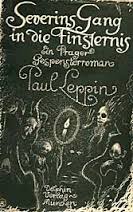Blaugast: A Novel Of Decline by
Paul Leppin (c. 1933)
Recommended by Harry
There are two styles of
books that majorly push my buttons.
Number one: a hefty, often
depressing, English Victorian novel.
Number two: a brief,
always depressing, European novel of the interwar period.
When I asked my friends
for their recommendations, the request came with just one coda. ‘Please don’t
make it too long,’ I said in various pubs / texts / emails. ‘I do have to read
it in a week.’ Of course, a few chose to ignore this request and recommend me
doorstops anyway (albeit with some cute justifications, e.g. Lizzie: ‘It’s five
books, yes, but they are children’s
books’; Geoff: ‘It looks thick, but
on some pages there are only a few words’; Barry: ‘Well, at least I’m not
recommending you Ulysses’). Anyway, I
wasn’t expecting (and I didn’t get) any lengthy Victorian novels. But I was
hoping to get at least one succinct slice of degenerate continental misery.
Are
you interested in catastrophes?
Always.
Blaugast: A Novel Of Decline is the
final novel of the Prague German Paul Leppin. Unlike his near-contemporary Franz
Kafka, there has been little posthumous celebration of this author; Blaugast, unpublished at the time, is
still a very niche work (this edition, the first commercial English
translation, is from 2007 on a small Czech imprint). I’d certainly never
heard of Leppin, and he seems unknown to even the keenest readers of European
modernism.
This is a terrible
literary injustice. For my money, Blaugast
ranks as one of the lost masterpieces of Mitteleuropa.
Engulfed by disasters, which he sought in vain to
understand, he found himself hopelessly adrift, surrounded by an enemy that
no-one ever called by its name. But its presence was irrefutable and cruel. It
made itself known in faltering discussions, ejaculations, and dissolute jokes,
in the cracks of doors and within the corners of rooms.
This is our anti-hero, Klaudius
Blaugast. A directionless middle-aged clerk, at the start of the novel he randomly
meets an old schoolfriend, Schobotzki. What, Blaugast cheerfully asks, has
Schobotzki been up to since school?
‘I’m going to seed,’ he said casually. […] ‘It has to do
with the research I’m involved in.’
Blaugast, intrigued,
follows Schobotzki to his ‘laboratory’ where he meets Wanda.
Her eyes, serenely cold, flickered like a candle’s flame
just before its death.
Prostitute and emotional
sadist, Wanda soon brings Blaugast under her powerful influence. He is
directionless no more. He becomes obsessed with Wanda and performs ever more
humiliating acts upon his own body and psyche. Physically, it leads to syphilis;
socially, it leads to financial ruin and homelessness; psychologically, it
leads to complete debasement.
A novel of decline,
indeed.
Yet Leppin does more than chart
one person’s degradation. His unflinching portrayal of wider society mercilessly goading the fallen man is an
equally strong (and even more morose) aspect of Blaugast.
The spastic goosestep of his uncontrollable legs, the
result of the disease now consuming his spinal cord, his face, altered by the
rigid dilation of his pupils, and the solemn rags he preferred as his wardrobe,
earned him the moniker ‘Little Baron,’ which he would acknowledge with an
awkward bow. The epithet was most commonly used by the children who ran behind
him and by the habitués of the beer gardens and pubs, who welcomed the patient
beggar with jeers and jokes.
Leppin particularly singles
out the malice of the bourgeoisie. Nietzsche wrote in Beyond Good And Evil that all high culture is based on cruelty*, and
perhaps Leppin is making reference to this. Leppin’s gloomy point that everyone
has a propensity for sadism as long as the victim is socially marginalized is
well made via one especially ugly episode. ‘Little Baron’ has been beckoned
into a wine bar.
After downing a few glasses of schnapps given him, he was ordered to
masturbate onto a plate in the presence of all for the succour of a meagre fee.
I’ve quoted from this book
so much because Leppin made me gasp on every page with his inventive prose. Look,
look, at how he describes
nervousness:
A rat’s tooth, voracious, bespattered with carrion,
gnawed at his intestines.
If I ever wrote a sentence
like that, I would just stare in the mirror for about a week, grinning at my
own brilliance.
This is my second
favourite book of the project (after The Underground Man). But unlike The
Underground Man, which I’m sure everyone who reads this blog would enjoy,
I’m far warier of pushing Blaugast on
people. Although there is some redemption within, it is nevertheless a pretty
nihilistic work, and certainly the kind of book you have to want to read. Next year I will explore
the other works by Leppin: Severin’s
Journey Into The Dark sounds incredible!
I’m interested in hearing
of how Harry acquired this particular taste and discovered Blaugast.
Because, really, I know
hardly anything about Harry, other than the reason why I asked him to
contribute to Two Readers: that he
has excellent taste. (Oh, and that he’s a prominent academic, and that two days
ago he viewed the house of a former member of Brit girl group The Paper Dolls).
He got in touch with me following Seasons
They Change, we’ve nattered over social networks, and had one abortive
attempt to meet up (trains and overrunning appointments stymied us).
I hope in the future our
luck will hold for some facetime. It has to: I feel that, as time goes on, we
are just stockpiling the many, many, many things we have to discuss. I’ll leave
you with just one of them.
*N.B. I know I sound pompous
here. However, my knowledge of this Nietzsche work comes entirely from Kevin
Kline’s character in A Fish Called Wanda.


